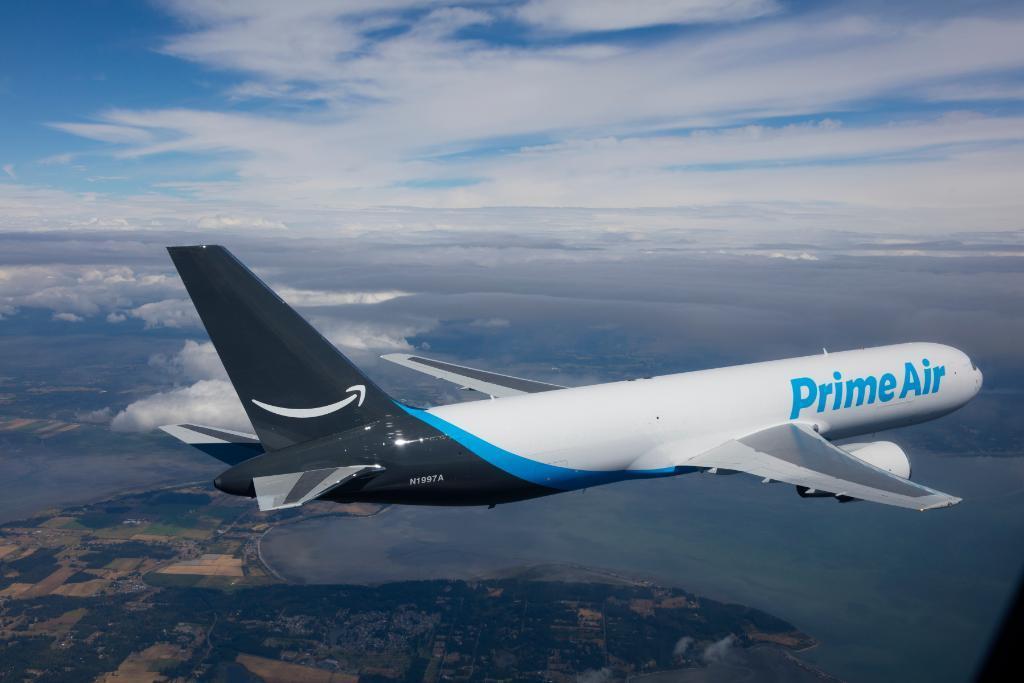Amazon Air Seeks MRO Managers As Online Boom Drives Express Cargo Conversions

There’s a lot more than missing belly capacity driving cargo conversions and freighter growth. Perhaps far more durably, the online sales boom is expanding traditional express carriers and may push a start-up express airline into third place among the giants.
During the virus crisis, e-commerce has sustained most of the actual growth in consumption spending. Despite U.S. GDP dropping 3.5% in 2020, the worst performance since 1946, U.S. online sales were up 44% for the year, according to Digital Commerce 360. And the roll continues. Adobe Analytics estimates U.S. online sales during the 2020 Christmas season increased 32% year-over-year. Ecommerce rocketed 62% in January 2021, compared with January 2020, according to Mastercard data.
Online sales now account for more than a fifth of U.S. retail sales. Amazon represents nearly a third of U.S. ecommerce, while other major U.S. online successes include Walmart, Apple, Target and Best Buy. The names are different, but the story is similar in Europe and Asia-Pacific.
Consumers who double-click to buy still want their purchases fast, as if they had really picked them up at a local retail outlet. And that expectation of speed favors air delivery over the long delivery segments. That is why express-cargo airlines are growing as well.
UPS revenue of $25 billion in the fourth quarter of 2020 was up 21% from same-period, 2019. And UPS’s average daily volumes of shipments from business to consumers more than doubled in 2020.
FedEx revenue in its latest quarter neared $21 billion, a 19% jump from the same period of fiscal 2019. U.S. overnight box revenue rose a modest 8%, but international priority revenue was up 38%.
The big winner in the online sweepstakes is of course Amazon, which now has its own airline to carry at least part of the ecommerce booty. Amazon Air is expected to grow to more than 80 aircraft in 2021, which would put it ahead of DHL Express’s fleet of 77 planes.
Amazon Air appears does business out of several hub-like centers, in Cincinnati, Fort Worth Alliance, Chicago Rockford and California’s Ontario airports. Previously using leased aircraft operated by other airlines, it is now buying its own aircraft and hiring aggressively.
The airline is currently seeking a variety of recruits, including a powerplant oversight manager to manage heavy maintenance of engines, APUs and thrust reversers, a program manager for heavy airframe maintenance, a manager of ground equipment and load device maintenance, a quality assurance manager, a safety risk management manager and a senior manager of freighter conversions.
So Amazon is looking more and more like a traditional airline. Joe Schwieterman, a former United Airlines exec who now directs DePaul University’s Chaddick Institute for Metropolitan Development, predicts the carrier has plenty of runway ahead.
“We argue they can set up delivery for third parties when they are ready,” Schwieterman says. “I think it’s logical, with their hub belt there will be great synergies with other retailers.”
Amazon Air is mostly a domestic U. S. carrier now, but it flies over the Atlantic and Pacific, is experimenting with consumer deliveries in the UK, and has started intra-European service. “We think they could see 200 aircraft and international operations in seven to eight years.”
Conversion programs have picked up faster because of Amazon and its fellow online successes. For example, Aeronautical Engineers converts Boeing MD-80s, CRJ 200s and a variety of 737s.
The company delivered 13 converted aircraft in 2020, and plans to deliver 37 in 2021. “All are under contract,” notes VP Robert Convey. The MRO exec says that more than three quarters of all these conversions are for express carriers and ecommerce.
IAI converts 737s, 767s and 747s. It did more than 20 conversions in 2020, and now, “We are running eight conversion lines at the same time, and we are fully booked,” says Communications Manager Lital Ben Ari. But she says she cannot disclose which mods are for express carriers due to confidentiality concerns.
Elbeflugzeugwerke converts Airbus A300s, A310s, A320s, A321s and A330s. Spokesperson Anke Lemke says EFW did seven conversions in 2020, of which three were for integrators like UPS, FedEx, DHL and Amazon. “In 2021, we will increase our capacity to better meet the growing demand by going double- digit with Airbus conversions.” Lemke expects about 30% of these will be for integrators.
Moreover, cargo networks have now extended well beyond mainline aircraft, using regional turboprops to feed into, and distribute from, mainline freighters. Sweden’s Täby Air Maintenance (TAM) converts Saab 340As and 340Bs for these purpose. “We did three P2F conversions in 2020, of which one was for an airline operating on behalf of express cargo carriers,” notes spokesman Anders Annerfalk.
TAM is already working on its second conversion for 2021 and has another two on order for this year. Out of these four certain conversions, two are for airlines operating on behalf of express-cargo carriers. And Annerfalk says the MRO is expecting an additional three to five conversions in 2021.





